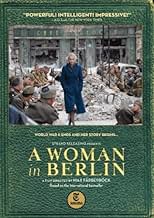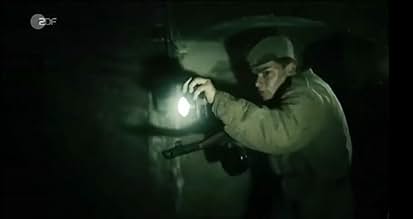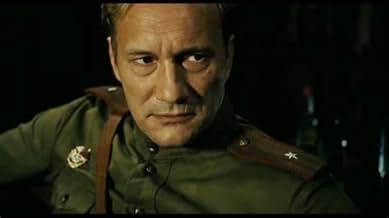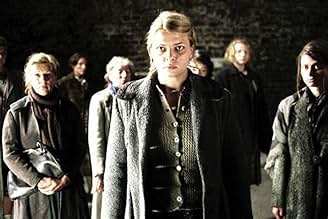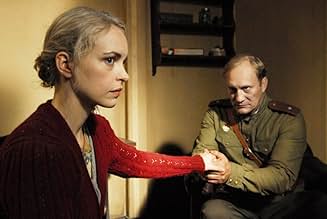IMDb RATING
7.0/10
7.2K
YOUR RATING
A woman tries to survive the invasion of Berlin by the Soviet troops during the last days of World War II.A woman tries to survive the invasion of Berlin by the Soviet troops during the last days of World War II.A woman tries to survive the invasion of Berlin by the Soviet troops during the last days of World War II.
- Director
- Writers
- Stars
- Awards
- 1 win & 4 nominations total
Evgeniy Sidikhin
- Major Andreij Rybkin
- (as Evgeny Sidikhin)
Viktor Zhalsanov
- asiatischer Rotarmist
- (as Victor Zhalsanov)
- Director
- Writers
- All cast & crew
- Production, box office & more at IMDbPro
Featured reviews
In 1959,a book was published in Switzerland,entitled 'Anonyma:Eine Frau In Berlin',about a woman who had lived through the liberation of Berlin by the Red Army,in 1945,just mere months before Adolf Hitler committed suicide. This book shocked those who had read it,also resulting in it being immediately banned in Germany (although it was eventually published there many years later). In 2008,German film maker,Max Farberbock adapted this eye opening novel into a new film from the original novel by the author (Anonyma). The film stars the lovely to look at,Nina Foss as Anonyma,who's husband is seen shipping out for the elite S.S. squad of the German Army the very morning of the Soviet invasion of Berlin in 1945. For the next three months,she,as well as the rest of the residents of Berlin are subjected to brutal treatment of their captors. Determined to survive this nightmare,she forges a relationship with the Russian leader, Major Andrei Rybkin (played by Yevgeni Sidikhin,who commands a genuine presence here),as well as a renegade member of the German army,that is hiding in the attic of the apartment block she lives in. The rest of the cast is made up of both German & Russian actors who truly live up to their roles (and watch out for a winning performance by Irm Hermann, generally known for her work in the films of the late Rainer Werner Fassbinder,as Witke).Comparisons to Paul Verhoeven's 'Black Book' will be obvious. Benedict Neuenfels' camera work,which gives this film it's grainy,grim look & Ewa J.Lund's tight editing is right on track This grim,gritty film is yet,another winning entry from Constantin Film Produktion,who gave us the likes of 'Last Exit to Brooklyn',and the recent,'Der Bader Meinhof Komplex'. The film is a bit long in the tooth,but there isn't a slack moment in it's 131 minute running time. Spoken in German & Russian with English subtitles. Not rated by the MPAA,this film contains rough language, violence,flashes of nudity & sexual content,including several unpleasant rape scenes
To begin with the end note: When the anonymous memoir adapted here ('Anonyma - Eine Frau in Berlin') was published in Switzerland in 1959, it was greeted with such outrage among Germans the author allowed no further editions; she of course never revealed her name. Here we are, fifty years later, and the material is still incendiary and hard to get your head around. It concerns events that are unspeakable and incomprehensible.
As played by the strikingly handsome, elegant Nina Hoss, "Anonyma" is an ash blond who can wear odds and ends as if they were couturier fashions, a journalist fluent in French and Russian, at home in Paris and London, who comes back from assignment to be in the Führer's capital for the final victory she still believes in. The Third Reich for her and her pals seems a time of freshness and energy for Germany. The war is just a blip on the horizon soon to be done with. She parties with fellow supporters of the Fatherland's great endeavor who toast the troops and boast that the buffoonish Russians will fall by the wayside. They don't, and when they invade Berlin and begin the wholesale raping of the German women, she chooses to mete out her favors selectively for her own protection and that of her neighbors in the apartment building. This is the story of how that happens.
When Berlin crumbles apartment dwellers are hiding in the basement, like ghosts; then, like condemned men and women given an uneasy reprieve, they return to living in the remnants of apartments. "Anonyma" moves in with a group of others in a large flat and turns over the studio she occupied with her absent soldier boyfriend Gerd (August Diehl), for whom she keeps a diary of what happens, to an unrepentantly Nazi young woman and the adolescent German soldier boyfriend she hides (Sebastian Urzendowsky), who is armed. This unwise gesture is the pistol we know will go off eventually, endangering everybody.
The film shows only two public events: the invasion, and the official German declaration that the Germans have surrendered Berlin. The period in between is the main focus of the diary and the film. It's not specified but it was about three months.
The film focuses on a handful of neighbors, who include ; two lively sisters (Joerdis Triebel, Rosalie Thomass), a strong-willed widow (Irm Hermann); an elderly bookseller (Katharina Blaschke); a liquor dealer (Maria Hartmann); a pair of lesbian lovers (Sandra Hueller, Isabell Gerschke); a refugee girl in hiding (Anne Kanis) and a stolid octogenarian (Erni Mangold). And there are more, not to mention a half dozen clearly defined Russians, including the high ranking officer's Mongolian guard.
It's a bit difficult to keep track of all these, and Woman in Berlin is best at making us feel close to the narrator and conveying a sense of the chaos and uncertainty when the invasion and the raping begin. There seems to be no control. It's hard to see that anything is going on. The Russians are just there, wandering free, and brutalizing the German women. When these women meet the question they ask each other is not whether but "How often?" Anonyma sleeps with various Russians, willingly and not. Protesting the violations and seeking a protective officer she first becomes involved with Anatol (Roman Gribkov), a pretty, frivolous man who turns out to be not a career soldier but a dairyman. He comes and goes and is no real help. She calls him "a gypsy." Then she finds a battalion commander, Major Rybkin (the excellent, charismatic Yevgeni Sidikhin), who is unresponsive when she confronts him boldly in front of a lot of Russian soldiers, and then comes around to find her. Unlike the Germans, she says later in her diary (which we see her constantly scribbling in pencil), the Russians appreciate an educated woman.
A strength of the film is that it alternates naturally between noise and violence, drunken celebration when Russians and Germans fraternize in the big apartment, and "love," which has lost its usual meaning, but lingers on. These extremes never seem overwrought or manipulative. Here's a time when in a film the fact that nothing makes sense, makes sense. The protagonist recognizes that in the eyes of many she is now a whore, but she questions what a whore is.
Marguerite Duras' screenplay for 'Hiroshima Mon Amour' is poetic and overwrought, ut in its rhythmic repetitions it strongly conveys a sense of the aftermath of trauma isn't found in the somewhat overlong 'Woman in Berlin,' which is simply about the confusion of day-to-survival in a world where morality is turned on its head. As Anonyma knew however and as we see in the film, the defeated must capitulate or die, and the invaders have suffered horribly too. One young soldier reconts in Russian, demanding that she translate to all present, how invading Germans brutally slaughtered all the children in his village while he watched. Even Andreij's wife has been killed by the Germans. And the film shows the range of the then Russian people, the Ukrainians, Caucasians, Mongols, who are to be the Soviet Union.
Though reviewers and commentators seem to think they know what all this material means and proclaim judgments if not on the protagonist, on the filmmaker, this is primarily an example of Germans taking hard looks at repressed material that formerly was too ugly to examine. This isn't an impassioned indictment or defense, but a movie that uses an extraordinary diary (only published in Germany in 2003) to present an admirably complex picture of a crazy time. If it is both remarkable in its focus and at times quite old fashioned in its methods, that's as good a way as any to get things across. The result is both specific and wide-reaching, because there's ample time to ponder a basic issue for civilians in wartime: what does it cost you to survive?
As played by the strikingly handsome, elegant Nina Hoss, "Anonyma" is an ash blond who can wear odds and ends as if they were couturier fashions, a journalist fluent in French and Russian, at home in Paris and London, who comes back from assignment to be in the Führer's capital for the final victory she still believes in. The Third Reich for her and her pals seems a time of freshness and energy for Germany. The war is just a blip on the horizon soon to be done with. She parties with fellow supporters of the Fatherland's great endeavor who toast the troops and boast that the buffoonish Russians will fall by the wayside. They don't, and when they invade Berlin and begin the wholesale raping of the German women, she chooses to mete out her favors selectively for her own protection and that of her neighbors in the apartment building. This is the story of how that happens.
When Berlin crumbles apartment dwellers are hiding in the basement, like ghosts; then, like condemned men and women given an uneasy reprieve, they return to living in the remnants of apartments. "Anonyma" moves in with a group of others in a large flat and turns over the studio she occupied with her absent soldier boyfriend Gerd (August Diehl), for whom she keeps a diary of what happens, to an unrepentantly Nazi young woman and the adolescent German soldier boyfriend she hides (Sebastian Urzendowsky), who is armed. This unwise gesture is the pistol we know will go off eventually, endangering everybody.
The film shows only two public events: the invasion, and the official German declaration that the Germans have surrendered Berlin. The period in between is the main focus of the diary and the film. It's not specified but it was about three months.
The film focuses on a handful of neighbors, who include ; two lively sisters (Joerdis Triebel, Rosalie Thomass), a strong-willed widow (Irm Hermann); an elderly bookseller (Katharina Blaschke); a liquor dealer (Maria Hartmann); a pair of lesbian lovers (Sandra Hueller, Isabell Gerschke); a refugee girl in hiding (Anne Kanis) and a stolid octogenarian (Erni Mangold). And there are more, not to mention a half dozen clearly defined Russians, including the high ranking officer's Mongolian guard.
It's a bit difficult to keep track of all these, and Woman in Berlin is best at making us feel close to the narrator and conveying a sense of the chaos and uncertainty when the invasion and the raping begin. There seems to be no control. It's hard to see that anything is going on. The Russians are just there, wandering free, and brutalizing the German women. When these women meet the question they ask each other is not whether but "How often?" Anonyma sleeps with various Russians, willingly and not. Protesting the violations and seeking a protective officer she first becomes involved with Anatol (Roman Gribkov), a pretty, frivolous man who turns out to be not a career soldier but a dairyman. He comes and goes and is no real help. She calls him "a gypsy." Then she finds a battalion commander, Major Rybkin (the excellent, charismatic Yevgeni Sidikhin), who is unresponsive when she confronts him boldly in front of a lot of Russian soldiers, and then comes around to find her. Unlike the Germans, she says later in her diary (which we see her constantly scribbling in pencil), the Russians appreciate an educated woman.
A strength of the film is that it alternates naturally between noise and violence, drunken celebration when Russians and Germans fraternize in the big apartment, and "love," which has lost its usual meaning, but lingers on. These extremes never seem overwrought or manipulative. Here's a time when in a film the fact that nothing makes sense, makes sense. The protagonist recognizes that in the eyes of many she is now a whore, but she questions what a whore is.
Marguerite Duras' screenplay for 'Hiroshima Mon Amour' is poetic and overwrought, ut in its rhythmic repetitions it strongly conveys a sense of the aftermath of trauma isn't found in the somewhat overlong 'Woman in Berlin,' which is simply about the confusion of day-to-survival in a world where morality is turned on its head. As Anonyma knew however and as we see in the film, the defeated must capitulate or die, and the invaders have suffered horribly too. One young soldier reconts in Russian, demanding that she translate to all present, how invading Germans brutally slaughtered all the children in his village while he watched. Even Andreij's wife has been killed by the Germans. And the film shows the range of the then Russian people, the Ukrainians, Caucasians, Mongols, who are to be the Soviet Union.
Though reviewers and commentators seem to think they know what all this material means and proclaim judgments if not on the protagonist, on the filmmaker, this is primarily an example of Germans taking hard looks at repressed material that formerly was too ugly to examine. This isn't an impassioned indictment or defense, but a movie that uses an extraordinary diary (only published in Germany in 2003) to present an admirably complex picture of a crazy time. If it is both remarkable in its focus and at times quite old fashioned in its methods, that's as good a way as any to get things across. The result is both specific and wide-reaching, because there's ample time to ponder a basic issue for civilians in wartime: what does it cost you to survive?
10hasosch
Max Färberböck, known to the world-wide audience since his "Aimee and Jaguar", shows in this newer film for once not the standard story of the bad Germans, who, deserving after what they have done, being Nazis, are liberated by the good Russians, the good Americans and the good Allies. It shows exactly the same experience that we all, who grew up in the East Block, had about our Russiand "friends". They came to rape, to destroy, to violate, to erase. It is a very interesting fact concerning mass psychology or perhaps better mass-psychosis that nobody normally speaks about the enormous amount of destruction done or caused by the liberators of end-World War II Europe. And nobody even mentions the Stalinist concentration camps. This is why we need films like "Eine Frau In Berlin".
However, in Färberböcks film, we see the Russians, "like animals, like pigs, an-alphabets, without culture" - as the Russian Major says it in his own words, he, who speaks, according to the main female character "a seldomly high-style Russian". Well, a little bit of "justness" had to be - not ALL Russians are like the "scum" (quotation from the movie) that we see. Interestingly, my Hungarian home-town had been bombed by Americans, but afterward the Russians came like vultures and pitched themselves into the ruins, what was female, was raped, what had been church or synagogue - was emptied and the treasures stolen, a subculture sneaking from the sou-terrain up to the ruins and even profiting from corpses and debris.
However, in Färberböcks film, we see the Russians, "like animals, like pigs, an-alphabets, without culture" - as the Russian Major says it in his own words, he, who speaks, according to the main female character "a seldomly high-style Russian". Well, a little bit of "justness" had to be - not ALL Russians are like the "scum" (quotation from the movie) that we see. Interestingly, my Hungarian home-town had been bombed by Americans, but afterward the Russians came like vultures and pitched themselves into the ruins, what was female, was raped, what had been church or synagogue - was emptied and the treasures stolen, a subculture sneaking from the sou-terrain up to the ruins and even profiting from corpses and debris.
rape is the particular plight of women during war and acknowledged at long last as a war crime.The plight of German women at the end of WW II was especially awful as they had protection from no one. General Eisenhower who punished rape committed by his men with execution outside of Germany (first rape took place six hours after invasion of Normandy had begun)but as for German women all men had free hands as these women were all declared "willing". The Americans are the only ones to have gone through archives as for army rape in WW II however the one recent book existing is not allowed for publishing in the US because of the war in Iraq (!!)so exists in French version only. The French and the British have preferred to turn a blind eye to what was done by their soldiers towards German women let alone the Russians. It is very important that this film has been made at long last. Subject concerns all not just its victims let alone the children born out of the horrors. Bravo Germany.
I haven't read the diary, but my father has and after we watched this together, he said that they got everything from the compelling book with its important testimony. This review is based upon the version with a two hour running time and six minutes of credits. After Berlin was taken over by Russian soldiers(among them men who had not had sex for four years) at the end of WW2, and raped 100.000 women, leading to the death of 10.000 of them. When this was first revealed in the late 50's, the truth outraged many in the country. It was called an attack on the virtue of female Germans. Fortunately, it was re-released in 2003, and now this excellent adaptation has hit theaters. There is apparently also a longer cut, and if the standard of this is maintained, it is undoubtedly great and worth it. This is gripping from start to finish. It all comes across as real and authentic(helped by the fact that they speak the three languages they are supposed to), and since this is entirely objective and doesn't take any sides in the conflict, you feel for both groups. The acting performances are spot-on. This has some marvelous little touches and details, and it is historically accurate. The characters are complex and psychologically credible. This is immensely well-produced. The camera-work and editing put you right in the situation when this fits, and is in general expertly done. This has extraordinary lighting. There are a few light portions that keep it from being all sad(without it taking away from how touching and engaging the rest of it is). It is tense and unpleasant when it means to be, albeit it isn't outright depressing. The atmosphere is built up well. There is a bit of moderate sexuality, nudity of both genders, brutal violence and disturbing content in this. The DVD comes with a trailer for this and ones for other films. I recommend this warmly to everyone mature enough for it. What happened should never be forgotten. 8/10
Did you know
- TriviaThe source novel was virtually banned in West Germany when it was first published in the late 1950s. When it was republished in 2003, it became a huge bestseller and nationwide sensation in a reunified Germany.
- GoofsWhen Germany's surrender is announced, the Soviet troops start singing the "Alexandrov version" of their national anthem, adopted about a year earlier. That version had no lyrics until Stalin intervened, and the heavy fighting wouldn't have allowed the soldiers to learn them. They most likely sang the chorus of "The Internationale," an earlier, better-known version.
- ConnectionsFeatured in History: Anonyma - Die Frauen von Berlin (2010)
- How long is A Woman in Berlin?Powered by Alexa
Details
- Release date
- Countries of origin
- Official site
- Languages
- Also known as
- Anónima - Una mujer en Berlín
- Filming locations
- Production companies
- See more company credits at IMDbPro
Box office
- Gross US & Canada
- $294,014
- Opening weekend US & Canada
- $12,439
- Jul 19, 2009
- Gross worldwide
- $1,863,939
- Runtime2 hours 11 minutes
- Color
- Sound mix
- Aspect ratio
- 2.35 : 1
Contribute to this page
Suggest an edit or add missing content

Top Gap
By what name was Anonyma - Eine Frau in Berlin (2008) officially released in India in English?
Answer


